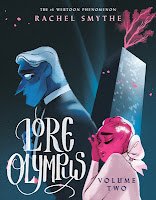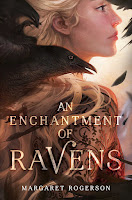Rating: 4.5 stars
CBR14 Bingo: Adaptation (Rachel Smythe's modern take on the Greek myths - and obviously especially Hades and Persephone is so cleverly done)
So, searching my blog and Goodreads to see what I wrote about Lore Olympus, my current web-comic obsession, I discovered that after finishing volume one in November last year, all I did was leave a two-sentence comment on Goodreads. If I recall correctly, I was pretty solidly burned out last winter, so I'm amazed I posted any reviews in the final months of the year.

So what's Lore Olympus about, and why did I seek out the webcomic and read an additional hundred and twenty issues after finishing volume 3? Rachel Smythe has taken the entire pantheon of the Greek gods and reimagined them brilliantly. The story begins when Kore, the young goddess of spring, who has been kept extremely sheltered in the mortal world for her entire short life so far, comes to Olympus to study. Her mother, Demeter, has reluctantly agreed to let her go, on the condition that she stays with Artemis, who is known for her chastity and because Kore, or Persephone as she is sometimes known, has received a scholarship via TGOEM, The Goddesses of Eternal Maidenhood (currently consisting of Artemis, Hestia and Athena, but always thrilled to get another member). The innocent Kore ends up at a party at Zeus and Hera's mansion, where Hades is overheard by Aphrodite as describing the young goddess of spring as even more beautiful than the goddess of love, and obviously, Aphrodite takes offense. She orders her son, Eros, to get Kore very drunk and plant her in Hades' car, hoping that this will cause both the maiden and the very serious god of the Underworld some difficulties. Instead, Hades takes our drunken heroine home to sleep it off (he lives alone in a very large, empty house with many dogs he's adopted). There's clearly a mutual attraction between them, but Kore is far too drunk for anything to happen. Hades does gift her a beautiful fur coat that Hera once rejected as a gift.
Hades is appalled when he is told by Hera that Kore/Persephone is only nineteen years old (while the gods don't really age after a certain point, she is actually just out of adolescence and raised almost exclusively in the company of women). As Hades is literally millennia old, he's not exactly going to make a move on a veritable child. Kore is mortified that she got drunk and had to have help from Hades, and when she discovers that he has a girlfriend (his assistant, the very bitchy nymph Minthe). And there's that whole pesky maidenhood promise she made in return for her scholarship. They both squash any pants feelings far down, but develop a flirty friendship.
Artemis tries not to be too overprotective of her new roommate, but unfortunately, her distraction and Kore's innocence and inexperience lead to her being taken advantage of by one of the more unscrupulous and selfish gods early on. Led to believe that she's overreacting when she gets upset, she instead blames herself for the assault and refuses to tell anyone about it (Smythe is very good about trigger warnings throughout the comic, but doesn't shy away from a lot of heavy and important themes). It makes her skittish and uncomfortable around most of the male gods, yet she always feels safe around Hades.
Hera, being the goddess of hearth and home, and blesser of human marriages doesn't entirely agree with her old friend Demeter's way of sheltering Kore/Persephone. She is fully aware how promiscuous most of the male and many of the female gods are (she is after all married to the biggest adulterer in the pantheon), so she decides to test Hades' feelings by orchestrating an internship for Kore in the Underworld. She knows her old friend has been lonely for eons and really doesn't approve of the stormy and often emotionally abusive relationship he has with Minthe. So she makes sure he'll see much more of the goddess of spring than he was planning on.
So that's basically the setup. Kore comes to Olympus and is overwhelmed. She and Hades form an almost instantaneous connection. In Smythe's story, there is no familial relationship between them at all. Demeter created her daughter herself, without any input from any god, so unlike in actual Greek mythology, Zeus is not her father and Hades is not her uncle. Because I think we can all agree that makes everything a lot ickier. With the exception of Hermes, the messenger of the gods, Koré has barely seen men while growing up and getting used to her powers. The realm of the gods is depicted as basically a modern world with computers, cell phones, cars, television, tabloids, and technology. The human world, where our heroine was raised, however, is portrayed as historical Greece, where the humans are still wearing smocks and togas and work primarily as farmers. So to come to Olympus at the age of nineteen, it's almost as if Kore has time-traveled. She's never had a phone before. She needs to be shown how to use a computer and social media and doesn't know that it's extremely bad to let a guy take compromising photos of you.
As well as building the very very slow-burn romance between Persephone and Hades, the comic also deals with the rest of the very chaotic Greek gods. Both Zeus and Hades are businessmen, but Hades seems to take his work a lot more seriously. Zeus seems fond of his wife Hera but has mistresses both in Olympus and the human realm. One of the reasons Demeter has kept her daughter so sheltered is that she's used to Zeus dumping whichever nymph he's recently had a tryst with in the human realm with her so that Hera can't find and exact vengeance on said nymphs. She doesn't want her daughter to end up with some serial adulterer. Sadly, her strict ways also leaves her daughter vulnerable to predators.
As well as the current ongoing lives of the gods, we get glimpses into their histories and how they came to power. Smythe's take on the mythology gives the goddesses, nymphs, and other women of the story way more agency than they tend to have in mythology. Hera is a complete badass, Hecate is Hades' formidable right-hand woman and Artemis is a loyal and protective friend to Kore/Persephone. While a lot of the nymphs, like Minthe and Thetis (Zeus' personal assistant and mistress) are presented as rather opportunistic, scheming, and generally rather morally flexible, there is no denying that they are resourceful women who tend to control their own narratives in a very decisive way.
While some of the gods are rather deplorable (Zeus, Ares, Apollo and Thanatos spring to mind), there are also some who are lovely and do their best to take care of Kore/Persephone and the other goddesses in their lives (Eros and Hermes especially). Hades is obviously everyone's tragic and lonely hero, faithful to his temperamental and rather shrewish nymph girlfriend until her rage and jealousy make it impossible for him to stay with her. He is always respectful of the women around him and tries to fight his attraction for Kore for as long as he can. She is always the one taking the lead when they are together.
The first volume is mainly set up and introduces the reader to the major players and the world they inhabit. In volumes two and three, the story develops and one of the ongoing mysteries is how young, innocent Kore, goddess of spring, whose name means "Maiden", has come to Olympus also known as Persephone, "Bringer of Death". Thetis, Minthe and Thanatos, who are all upset by the nepotism and special favours they feel Kore has received since her arrival in Olympus, spend a lot of time investigating exactly this. When the truth was revealed at the end of volume three, there was no way I was going to sit around waiting until May 2023 to get more of the story, when so much more was readily available to me online. Now I'm only vexed that there is nowhere for me to log the many issues I've devoured in a very short space of time, which I worked out will probably take me to the end of volume eight once the books are out. And also, now I'm going to have to wait impatiently for new weekly installments, like other long-time fans of the comic.
This review is already very long, and I haven't even raved enthusiastically about Smythe's art style and the very cool way she portrays the various characters. Kore/Persephone is a young, curvy woman with a short pixy cut, completely pink. Her hair has a life of its own and seems to grow every time she feels strong emotion, so she frequently has it trailing all the way to her feet or longer. When she gets angry, her eyes turn completely red. Hades is all blue and in Olympus, he tends to wear sharp suits and has his white hair cut short. In more private moments, he wears hoodies and sweats and he loves swimming. As previously mentioned, he has many dogs, Cerberus obviously being the most well-known. Zeus has long hair and is all purple. Poseidon, the middle brother, is all green and seems to be portrayed as a happy-go-lucky surfer dude who eats a lot. He tries to keep the peace between his two brothers, which isn't always easy. Hera is all yellow, Aphrodite is an almost lavender colour. Eros is a soft pink. Hermes is red, with a shock of wild hair. Apollo and Artemis are also purple, but different shades from Zeus and Aphrodite. Minthe is dark red, while Hecate is a somewhat darker blue than Hades with black hair in a stylish bob. The colours make it much easier to keep track of the constantly changing cast of characters, too, which never hurts.
I absolutely love these comics, and the only reason I haven't rated these volumes five stars is that I know an even more exciting plot is coming down the line. So I'm saving the last half a star for that. I wholeheartedly recommend these to anyone. The relationship between Hades and Persephone is all that is swoony and romantic. There is no abduction or trickery or forced eating of pomegranates here. Just mutual respect and support, as well as a lot of pining, so the first time they actually kiss, I may have cheered out loud. I'm going to continue buying the books (which collect about 25 issues each), but for anyone short of cash, the first 217 issues are available on Webtoon.
Judging a book by its cover: The covers give you some idea of Rachel Smythe's art style and how she portrays Hades and Persephone. I love these covers, just like I love art style, her skill at storytelling and just everything about this story.











